七年级英语下册课件+练习 (18)
- 格式:docx
- 大小:62.39 KB
- 文档页数:4
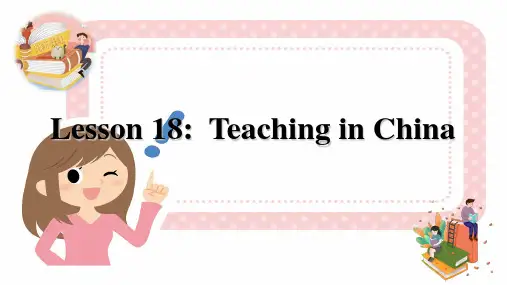
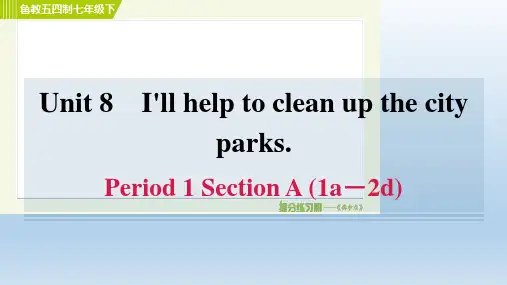
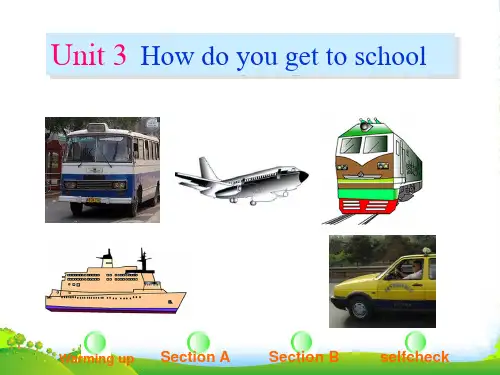
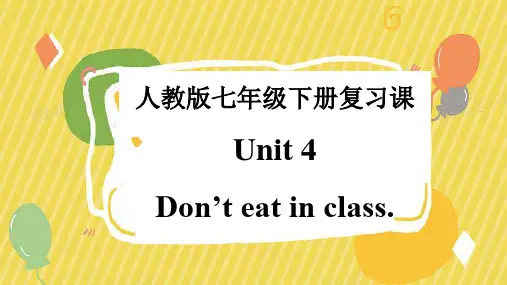
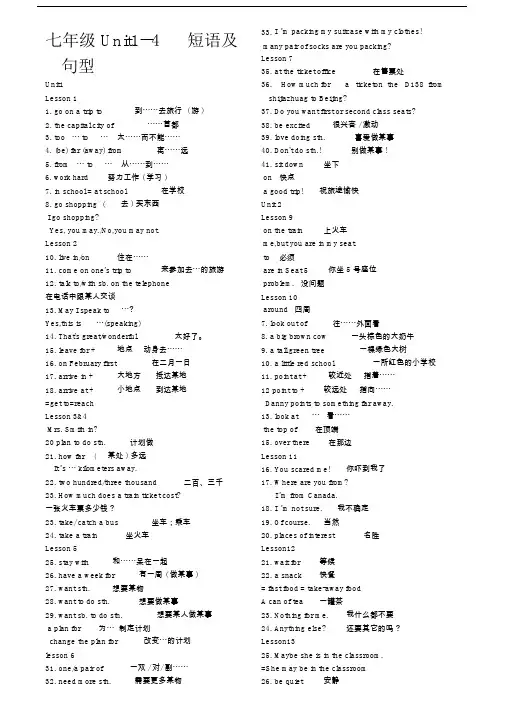
七年级 Unit1--4 短语及33. I ’m packing my suitcase with my clothes!many pair of socks are you packing?句型Lesson 735. at the ticket office 在售票处Unit1 36. How much for a ticketon the D138 from Lesson 1 shijiazhuag to Beijing?1. go on a trip to 到⋯⋯去旅行 ( 游 ) 37. Do you want first or second class seats?2. the capital city of ⋯⋯首都38. be excited 很兴奋 / 激动3. too ⋯ to ⋯太⋯⋯而不能⋯⋯39. love doing sth. 喜爱做某事4. (be) far (away) from 离⋯⋯远40. Don't do sth.! 别做某事 !5. from ⋯ to ⋯从⋯⋯到⋯⋯41. sit down 坐下6. work hard 努力工作 ( 学习 ) on 快点7. in school = at school 在学校 a good trip! 祝旅途愉快8. go shopping ( 去 ) 买东西Unit 2I go shopping? Lesson 9Yes, you may./No,you may not. on the train 上火车Lesson 2 me,but you are in my seat.10. live in/on 住在⋯⋯to 必须11. come on one's trip to 来参加去⋯的旅游are in Seat 5 你坐 5 号座位12. talk to/with sb. on the telephone problem. 没问题在电话中跟某人交谈Lesson 1013. May I speak to ⋯? around 四周Yes,this is ⋯(speaking) 7. look out of 往⋯⋯外面看14. That's great/wonderful. 太好了。
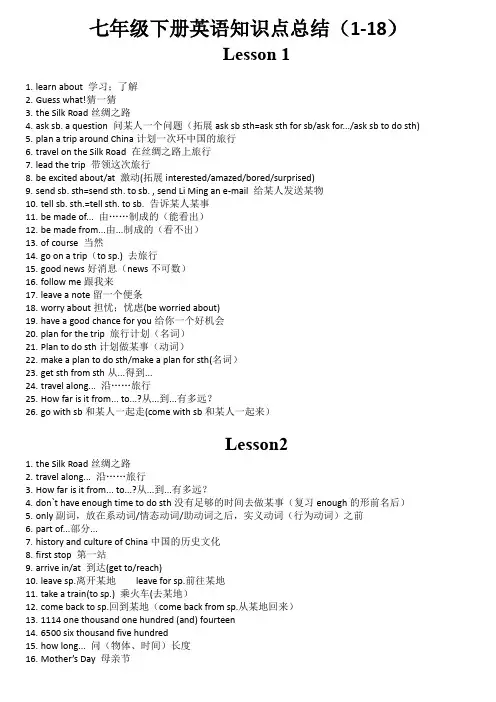
七年级下册英语知识点总结(1-18)Lesson 11.learn about 学习;了解2.Guess what!猜一猜3.the Silk Road丝绸之路4.ask sb. a question 问某人一个问题(拓展ask sb sth=ask sth for sb/ask for.../ask sb to do sth)5.plan a trip around China计划一次环中国的旅行6.travel on the Silk Road 在丝绸之路上旅行7.lead the trip 带领这次旅行8.be excited about/at 激动(拓展interested/amazed/bored/surprised)9.send sb. sth=send sth. to sb. , send Li Ming an e-mail 给某人发送某物10.tell sb. sth.=tell sth. to sb. 告诉某人某事11.be made of... 由……制成的(能看出)12.be made from...由...制成的(看不出)13.of course 当然14.go on a trip(to sp.) 去旅行15.good news好消息(news不可数)16.follow me跟我来17.leave a note留一个便条18.worry about担忧;忧虑(be worried about)19.have a good chance for you给你一个好机会20.plan for the trip 旅行计划(名词)21.Plan to do sth计划做某事(动词)22.make a plan to do sth/make a plan for sth(名词)23.get sth from sth从...得到...24.travel along... 沿……旅行25.How far is it from... to...?从...到...有多远?26.go with sb和某人一起走(come with sb和某人一起来)Lesson21.the Silk Road丝绸之路2.travel along... 沿……旅行3.How far is it from... to...?从...到...有多远?4.don`t have enough time to do sth没有足够的时间去做某事(复习enough的形前名后)5.only副词,放在系动词/情态动词/助动词之后,实义动词(行为动词)之前6.part of...部分...7.history and culture of China中国的历史文化8.first stop 第一站9.arrive in/at 到达(get to/reach)10.leave sp.离开某地leave for sp.前往某地11.take a train(to sp.) 乘火车(去某地)e back to sp.回到某地(come back from sp.从某地回来)13.1114 one thousand one hundred (and) fourteen14.6500 six thousand five hundred1.welcome to… 欢迎到…2.over=more than 超过,多余eg: He is over 40 years old.= He is more than 40 years old.3.climb up 爬上;攀爬4. hit the ancient drum 击打古钟hit-hit-hit-hitting(原形-过去式-过去分词-现在分词)5. play the drum 敲鼓6.ring the bell 敲钟7.参观某地visit sp.=pay a visit to sp. 拜访某人visit sb. Visitor n.游客8.special dishes 特别的菜肴11. enjoy doing sth. 享受做….12. call sb. sth. 称呼某人…13.one of the horses 其中一匹马one of + the + 名词复数,意为“ ……之一”,eg:one of my classmatesone of + the + 名词复数整个结构做主语,谓语动词用三单eg: One of my classmates is from China.14.take photos/pictures 照相15. No photos. 禁止照相No +n/ving 禁止做某事16. places of interest 名胜古迹17.the Walled City 有城墙的城市18.move v.移动,搬动—moved(过去式)moved adj.感动的(修饰人)movinng adj.令人感动的(修饰物)eg: I am moved by this moving movie.19.Have fun doing= have a good time=enjoy oneself 玩的开心20.祈使句Please stand here with me and move with me.对祈使句的回答往往使用will或won’t。
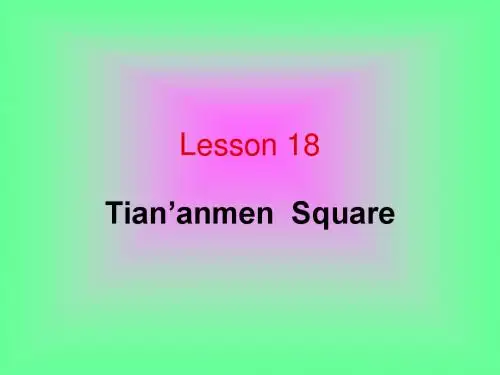
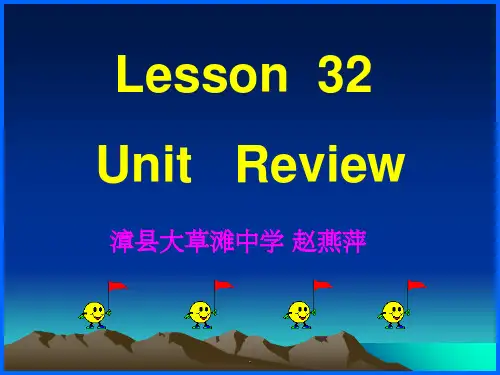
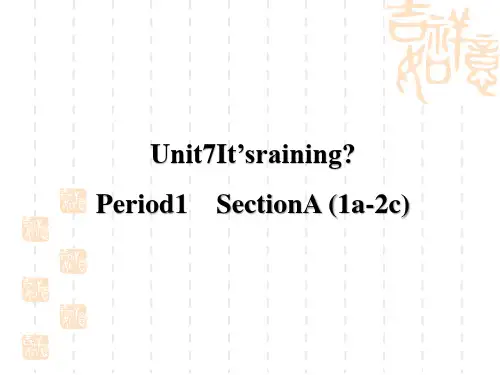
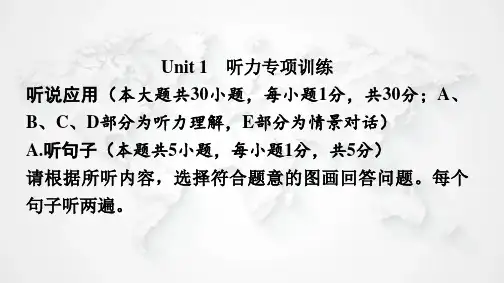
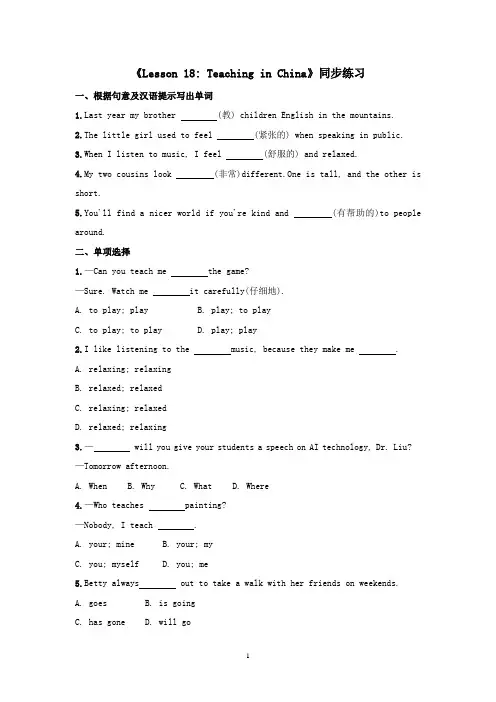
《Lesson 18: Teaching in China》同步练习一、根据句意及汉语提示写出单词st year my brother (教) children English in the mountains.2.The little girl used to feel (紧张的) when speaking in public.3.When I listen to music, I feel (舒服的) and relaxed.4.My two cousins look (非常)different.One is tall, and the other is short.5.You'll find a nicer world if you're kind and (有帮助的)to people around.二、单项选择1.—Can you teach me the game?—Sure. Watch me it carefully(仔细地).A. to play; playB. play; to playC. to play; to playD. play; play2.I like listening to the music, because they make me .A. relaxing; relaxingB. relaxed; relaxedC. relaxing; relaxedD. relaxed; relaxing3.— will you give your students a speech on AI technology, Dr. Liu? —Tomorrow afternoon.A. WhenB. WhyC. WhatD. Where4.—Who teaches painting?—Nobody, I teach .A. your; mineB. your; myC. you; myselfD. you; me5.Betty always out to take a walk with her friends on weekends.A. goesB. is goingC. has goneD. will go三、连词成句1.writing, he, his, is, an e-mail, to, family?2. had, last weekend, he, a, wonderful, school trip.3.I'm, to, happy, be, so, your, friend.4.learn, friendly, others, to, be, to.5.often, from, they, one, to, move, another, city.四、从方框中选择最佳选项补全对话(有两项多余)(Peter is an exchange student in your school. Now you are talking about his life in Henan.)A: Hello, Peter!1.B: Great! I enjoy everything here!And I'm going back next Wednesday.A:2.B: Yes, I went to Shaolin Temple, Mount Song and so on. They are really great. A: Do you like the food here?B: Yeah. 3. I like Henan stewed noodles(烩面)best.A: What do you think of the people here?B:4. They are always ready to give me a hand when I'm in trouble. A: I'm happy to know you have a good time here.It's Saturday tomorrow. We can go to Henan Museum together.B: That sounds fun. 5.A: We can ride a bike. It's not far from our school.B: OK.五、阅读理解What do you think of your school life? Someone says it is very boring because they just have lessons all day. But let me tell you how you can make your school life full of fun.I am in school now but believe me, I enjoy my school days a lot.There are lots of ways to help you stay happy at school.First, you should make a lot of friends. You can share joy and sadness, enjoy your school days and do everything together with them.Second, you'd better be in one of your school sports clubs. You can take part in different sports or matches. It doesn't matter who wins because playing itself is fun. Sports will make your school life colourful. Third, you should do well in study. Your marks will be an important factor. With good marks, you will find it easier to be happy.I am sure if you do the above three things, you'll enjoy yourself very much at school. You'll love to go to school and maybe want to go to school even at the weekend.1.The writer his/her school life.A. doesn't likeB. enjoysC. feels bored withD. is tired of2.You should make some friends at school,because .A. friends can help you with your homeworkB. you can't have your classes on your ownC. your parents ask you to do soD. you can share your feelings and do other things with them3.Sports can be an important part of your school life if you .A. are in every sports clubB. take part in all kinds of matchesC. play sports for funD. win all matches4.It is to be good at school study.A. importantB. interestingC. easyD. hard5.The best title for this passage is .A. School ClubsB. How to Enjoy Your School LifeC. How to Get Good MarksD. How to Make Friends at School参考答案一、根据句意及汉语提示写出单词1.taught句意:去年我哥哥在山里教孩子们英语。
北师大附属中学七年级英语期末复习题及答案第一卷(60分)第一部分听力一、听对话,看问题,选择恰当的图片,每段对话听一遍。
(每小题1分,共5分) 1.Who are the children talking about?2.Where will Jack put the ice cream?3.How does the girl usually come to school?4.What animal can they see in the zoo?5.What’s the weather like?二、听问题,选择最佳答案,每个问题听两遍。
(每小题0.5分,共2.5分)6.A.Yes,I go to school by bicycle.B.Yes,I can speak fluent English.C.Yes,I have two brothers.D.Yes,I like to play tennis.7.A.No,she didn’t take a walk in the park.B.No,I won’t tell her the secret.C.Yes,we practice English every day.D.Yes,she must be interested in the film. 8.A.Yes,I decided to go to college this year.B.Here.I cooked some noodles for you.C.No,Lisa isn’t angry with you.D.This is the most wonderful trip.9.A.Yes,I have two.We can go together.B.Yes,have a cup of tea or coffee,please.C.Yes,I come from JapanD.Yes,it’s my computer.10.A.Your pet dog is really adorableB.I’m so thirsty.I could drink a bottle of water.C.Yes.I’m the third child in my family.D.My pencil-box.I think I lost it here.三、听对话和问题,选择正确的答案,每段对话听两遍。
(新人教版)初一七年级下册英语全套练习册配套参考答案(精校版)新人教版初一七年级下册英语全套练习册答案Unit 1Section AI. 1. dance 2. sing 3. swim 4. paint 5. pay chess6. play the guitar7. play the piano8. English club9. swimming club 10. want to join a club 11. be good atⅡ. 1. Can 2. want 3. join; swimming 4. do 5. or 6. inⅢ. 1-5 CBAAC 6-9 BCBBSection BI. 1. speak 2. violin 3. club 4. tell 5. doesⅡ.1. tell stories 2. play chess 3. play the drums 4. play the violin 5. play the piano 6. play basketball 7. sing and dance8. English-speaking students 9. make friends 10. can do kung fu 11. call sb at 12. musicians wanted 13. come and show us14. help with sports 15. music festivalⅢ.1-5 BBCBB 6-8 ACCSelf Check 1I. 1. singing 2. piano 3. chess 4. painting 5. musicianⅡ.1. do 2. to 3. want 4. club 5. play 6. can’tⅢ. 1. with my 2. Is; with; is 3. Can I help you? 4. can’t do5. What can; do6. What; does; wantIV. sing; Can; do; play; the violinSelf Check 2I. 1-5 CAABCII. 1.students 2.swimming 3. Chinese 4. musicians 5. stories III. 1-5 ACABB 6-10 CBACAIV. 1-5 CDBEAV. 1-5 BACCA 6-8 ABCVI. 1-5 BBCCBVII. One possible version:There are six musicians in our school band. They are very talented. My favorite musician is Li Hua. She is the best. She can sing and dance well. She can play the piano, too. Wang Hai can play the trumpet. Li Jun can play the violin. Cai Ming can sing and play the violin. Chen Hui and Chen Yang can play the drums.Unit 2Section AI. 1. go to school 2. get up 3. eat/ have breakfast 4. take a shower 5. get dressed 6. go to work 7. brush teeth 8. radio station 9. be late for work 10. at eleven 0’clockII. 1-5 CACCA 6-10 CCCCBIII. 1. What time does; go 2. What do; to do 3. doesn’t do4. Does; start; does5. don’t thinkSection BI. 1. do homework 2. go home 3. at about six thirty 4. go to bed 5. be good for 6. either ...or 7. get home 8. a quarter to seven 9. after school 10. take a walk 11. play sports 12. eat vegetablesII. 1-5 BACBC 6-8 ACBIII. 1-5 ABCCA 6-7 BCSelf Check 1I. 1. usually 2. shower 3. evening 4. about/ around5. healthy6. gets7. job8. SaturdayII. 1-5 BBCAC 6-9 BABCIII. 1-5 DACBEIV. 1. their 2. me 3. funny 4. brushes 5. Does; work6. takes7. to know8. doesn’t doSelf Check 2I. 1-5 CABBCII. 1. does; do 2. to sleep 3. does; work 4. puts 5. speak6. do; have7. Tell8. gets9. LookIII.1-5 BABCB 6-10 CBABCIV. 1. time 2. at 3. early 4. have 5. and 6. about7. do 8. by 9. on 10. takeV. 1. comes 2. school 3. days 4. students 5. teaches6. playing7. like8. Chinese9. talks 10. SundayVI. 1-5 TTFFFVII. One possible version:Hi! I’m Jack. I usually get up at 6:50 in the morning. Then I eat breakfast at around 7:20. At around 7:45, I go to school. I have lunch at 12:00 in the school. After school, I sometimes play basketball for half an hour. Then I go home at 5:30. I have dinner at 6:20. After dinner I do my homework and watch TV for a while.I go to bed at 10:00.Unit 3Section AI.1.ride a bike 2. forty-six minutes 3. take the subway 4. take the bus 5. walk to school 6. get to school 7. drive a car8. how far 9. it takes ... to do sth. 10. how longII. 1. ride 2. walks 3. takes 4. train 5. minutesIII. 1-5 ACBCB 6-10 ACBCAIV. 1-5 CAEBDSection BI. 1. kilometers 2. village 3. early 4. bridge 5. crossII. 1-5 BABCC 6-10 BBACBIII.1. How 2. How far 3. How long 4. Where 5. WhatⅣ.1. ride; station; take 2. most; to get to 3. eleven-year-old; crosses; school 4. How far does; live 5. ride; boring; talk with V. 1-5 ACBAB 6-10 CACACSelf CheckI. 1-5 CBCAAII. 1-5 ACBEDIII. 1-5 ABBCA 6-10 AACACIV. A: 1-5 FTFFT B: 1-5 FTTFTV. One possible version:Mary’s home is about three kilometers from school. She usually goes to school by bus. It takes about ten minutes. Tom lives about five kilometers away from school. He goes to school in his father’s car. It takes twelve minutes. Simon and Bill are brothers. Their home is eight kilometers from school. They take the subway to school. It takes about twenty minutes. Jesse lives near the school. It’s o n ly two kilometers from her home to school. So she goes to school on foot. It takes twenty-fiveminutes.Unit 4Section AI. 1. uniform 2. eat 3. can’t 4. hallway 5. keep 6. quietII. 1-5 BACAAIII. 1. run in the hallway 2. be/ arrive late for school 3. eat in the classroom 4. listen to music 5. wear hats 6. has to; gym class 7. Do; wear school uniforms 8. What elseSection BI.1-5 ACBAC 6-8 BACII. School rules:1,2,6,7,11,14Library rules:9,12 ,15Traffic rules:4,10,13House rules:3,5,8Self Check 1I. 1-5 CBAACII. 1. can’t come2. Don’t do 3. When do; have 4. Does; have to5. What; think ofIII. A. (1, 2) B. (2, 3) C. (1, 2 ) D. (3) E. (3) F. (2)Self Check 2I. 1-5 BCCAA 6-10 CBBAAII. 1-5 TFTFTIII. One possible version:Dear David,I’d like to tell you t he rules in our school. We have too many rules. We can’t run in the hallways. We can’t arrive late for class. We can’t listen to mu sic in the classroom. And we have to wear our school uniforms. We have to clean our classroom and do homework every day. What do you think of our rules? Pleasewrite to me soon and tell me your school rules.Yours,Li PingUnit 5Section AI. 1. south 2. Pandas 3. zoo 4. map 5. elephantII. 1-5 BAABBIII. 1. Why; very cute 2. does; like; Because; kind of interesting 3. animal; dogs; Why; friendly and smart 4. are; from; are from South AfricaIV. 1-5 DACBEV. 1. They are fromAustralia. 2. Yes, they are. 3. Where do4. from; too5. Are tigers beautiful animals?Section BI. 1-5 ACABC 6-10 CACAAII. 1. danger 2. quiet 3. lazy 4. to relax 5. scaryIII.1-5 BABABⅣ.1-5 CEADBV. 1. kind of 2. South Africa 3. get lost 4. be in danger5. cut down6. be made ofSelf Check 1I. 1-5 AAACCII. 1. Do;eat 2. doesn’t do 3. Can you 4. Why; like5. Where are;fromIII. 1. It’s next to the zoo entra nce. 2. It is large.3. There aren’t many i nteresting animals in the zoo.4. Why are giraffes interesting?5. How many pandas are there in Panda House?Self Check 2I. 1. leaves 2. friendly 3. beginning 4. animals 5. ChineseII. 1-5 CACAB 6-10 CCACBIII. 1-5 FTTFFIV. One possible version:I have a small dog. Its name isCoco. It’s brown with two big eyes. It’s very smart and friendly. Its favorite food is bones. It likes to take a walk with me every day.Unit 6Section AI. 1. do homework 2. watch TV 3. make soup 4. talk on the phone 5. go to the movies 6. eat out 7. use the computer 8. wash the dishes 9. read a newspaper 10. are; doing; watching 11. doing; is doing homework 12. doing; is reading 13. to go to the movies; Certainly; boring; When; Let’s go 14. reading 15. going II.1-5 CACBCIII. 1-5 DBAECSection BI. 1. swimming 2. library 3. misses 4. delicious 5. readingII. 1. is shopping 2. are watching 3. photos 4. cleans 5. play III.1-5 BBACBIV. 1-5 ACBABSelf Check 1I. 1-5 CCAACII. 1-5 CBCAA 6-10 CBBCAIII. One possible version:It’s five o’clock in the afternoon. Some students are in the classroom. They are doing different things. Two boys are cleaning the windows. Li Fang is reading a book. Wang Lin is doing homework. Lucy and Lily and talking. And Zhu Tao is drawing apicture.Self Check 2I. 1-5 CBBCAII. 1. swimming 2. shopping 3. libraries 4. children 5. photos6. leaves7. studies8. plays9. dirty 10. dangerousIII. 1-5 AABBC 6-10 ACCBAIV. 1. They are at home. 2. He is Tom’s classmate and g ood friend.3. Who is in the kitchen?4. Where is Mr. Black?5. What are they doing now?Unit 7Section AI. 1. snowy / snowing 2. playing 3. is 4. are running 5. cleanII.1-5 BBAACIII. 1-6 FBDEACIV. 1-5 FTFTTSection BI. 1-5 BACCAII. A) 1. summer 2. cooking 3. aunt 4. hot 5. doctorB) 6. windy 7. relaxing 8. are watching 9. playing 10. to callIII. 1. not bad 2. studying inToronto 3. cold and snowing 4. pretty good 5. sunny and hotSelf Check 1I. 1-5 BACBCII. 1. What is the weather like now? 2. What are you doing at home? 3. That sounds like fun. 4. How is it going with your family?5. She is calling to say happy birthday.III.1. How’s;weather 2. What’s the weather like 3. What is;wearing 4. What’s the weather like/ How is the weather5. What an interesting place6. What bad7. very snowySelf Check 2I. 1-5 BCABCII. 1. How’s the weather; What’s the weather like; hot and dry2. How’s it going; Great3. beautiful; sunny4. take a message5. call me back6. many people; on vacation7. summer school8. by the pool 9. a very interesting place 10. It’s winter11. having a good time 12. in the rainy weatherIII. 1-5 CBABC 6-10 CAACBIV. One possible version:It is 5:30 on Saturday afternoon. The weather is sunny. Jack and his family are all at home. They are doing different things. Jack is doing homework in his bedroom. His mother is cooking dinner in the kitchen. His father is washing the car in the yard. His grandfather and grandmother are watching TV in the living room.Unit 8Section AI. 1. near here 2. on 3. across from 4. next to 5. in front of 6. between; and 7. behind the library 8. in the neighborhood 9. post office 10. pay phone 11. go straight 12. turn leftII. 1. between 2. post office 3. library 4. supermarket 5. across III. 1-5 BCCBAIV. 1.Th ere isn’t 2. Are;any 3. Where is 4.behind 5. near hereV. 1. there was no petrol left 2. a woman 3.West Street 4. walked5. the petrol station was closedSection BI. 1. go along the street 2. turn right 3. at the first crossing4. spend time5. enjoy reading6. on your rightII. A) 1. zoo 2. behind 3. across 4. front 5. libraryB) 6. turning 7. easily 8. yours 9. playing 10. neighborhoodIII. 1-5 ACABAIV. 1-5EACDBV. 1. It’s onGuangming Street. 2. Yes, it is.3. Is there a big garden across from your school?4. How many buildings are there in your school?5. Where can I find your school?Self Check 1I. 1-5 AAACCII. 1-5 BCCAB 6-10 CCABAIII. 1-5 FTFTFSelf Check 2I. 1. Excuse 2. Where 3. Sorry 4. ask 5. know 6. way 7. along/down 8. take 9. turning 10. see/findII. 1-5 BCACA 6-10 CCBACIII.1. He’s from Canada.2. He’s looking for his parents.3. He’s going to the People’s Park.4. Jack is.5. He’s going there by taxi.Unit 9Section AI. 1. curly 2. height 3. brown / blonde 4. cinema 5. heavyII. 1-5 BBACCIII. 1. look like 2. short hair 3. long hair 4. curly hair 5. straight hair 6. medium height 7. medium build 8. short straight hair9. wear glasses 10. go to the moviesIV. 1-5 BEDCASection BI. 1. build 2. singer 3. Handsome 4. actor 5. roundII. 1. artist 2. actress 3. him 4. glasses 5. differentlyIII. 1. has 2. is 3. is 4. has 5. is 6. hasIV. 1-5 ACBABSelf Check 1I. 1-5 ACABBII. 1. doesn’t do 2. Does; have 3. Who does; look 4. of medium height 5. inIII. 1-5 BCBCA 6-10 BACBAIV. 1. round 2. light brown and short 3. thin 4. long curly 5. big blueSelf Check 2I. 1. know 2. look 3. medium 4. bit 5. curly 6. glasses 7. good-looking 8. jokes 9. popular 10. rememberII. A) 1-5 CBCABB)1. Susan. 2. Because she has an important meeting. 3. William. 4. Tall. 5. Yes, she does. III. One possible version: My favorite teacherMy favorite teacher is my English teacher. She is Miss Li. She is thin and of medium height. She has long curly black hair. She wears glasses. She’s very good-looking. She likes singing and playing the guitar. She often teaches us to sing English songs. I like her very much.Unit 10Section AI. 1. large 2. drink 3. tomatoes 4. seasons 5. dumplingsII. 1-5 AABCBIII. 1. some; a 2. some; a 3. an 4. some 5. an; someIV. 1. what kind of 2. beef and tomato noodles 3. a large bowl of noodles 4. What kind of; would; like 5. would he like ; small/medium/largeV. 1. Can 2. help 3. some 4. noodles 5. do 6. have 7. do 8. have 9. large 10. medium 11. small 12. mediumSection BI. 1. tomatoes 2. to play 3. sunny 4. onion 5. eatingII. 1-5 CACCAIII. 1-5 CEBDASelf Check 1I. 1. orange juice 2. green tea 3. around the world 4. make a wish 5. blow out 6. cut up 7. takeone’s order 8. a large bowl of9. and 10. or 11. come; eat 12. small; medium; or large13. some soupII. 1-5 BACCASelf Check 2I. 1. What kind of books 2. would like 3. large bowl 4. cups of5. for breakfastII. 1-5 ACBCAUnit 11Section AI. 1. farmers 2. walk 3. trip 4. grow 5. CowII. 1-5 BCABBIII. 1. go for a walk 2. milk a cow 3. ride a horse 4. feed chickens 5. take photos 6. in the countrysideIV. 1. played 2. visited 3. talked 4. climbed 5. studied6. worried7. stopped8. practiced9. did 10. was11. were 12. had 13. ate 14. bought 15. rode 16. took17. went 18. FedV. was; was; visited; did; do; went; fed; was; was; was; was; watched;wereSection BI. 1. climb the mountains 2. go fishing 3. visit the museum 4. fire station 5. all in all 6. be interested in 7. play chess 8. gift shop II. A) 1. delicious 2. walk 3. classmate 4. water 5. expensiveB) 6. boring 7. took 8. were 9. interested 10. to makeIII. 1-5 CDEABSelf Check 1I. 1. didn’t make 2. Did; go 3. What did; do 4. Where did; go5. went shoppingII.1. did; go; the countryside 2. How; was great 3. Did; No 4. how to make 5. All in all; excitingIII. 1-5 ABCACSelf Check 2II. 1. Last summer. 2. Under a big tree.3. How did you get to the foot of the mountain?4. How was the food?5. We weren’t very happy.III. One possible version:Sunday, April 9thThe weather was fine. All my classmates went to the park.We climbed the hills, boated on the lake, and flew kites all morning.At noon, we had a picnic near a big tree. In the afternoon, some girlssang and danced, some boys talked in English, and some studentsplayed games there. When we went home, it was late. I was tired, butI was really happy.Unit 12Section AI. 1. were; was 2. go; went 3. having 4. called; was; said 5. did; playedII. 1-5 CCBAAIII. 1. on Saturday morning 2. last weekend 3. do; homework 4.go boating 5. beautiful beach 6. clean one’s r oom 7. the library 8. the movies 9. the pool 10. play tennis 11. play badminton 12. play the guitar 13. study for 14. camp by the lake 15. great; OK; wasn’t 16. did; do; stayed; studied for the math test 17. On Saturday eveningSection BI.A) 1. week 2. visited 3. library 4. test 5. middleB) 6. cleaned 7. had 8. wanted 9. was 10. wentII. 1-5 BAABAIII. 1. play the guitar 2. go to the library 3. study for the test 4. in the afternoon 5. fly a kite 6. swimming pool 7. clean the room 8. go shopping 9. have dinner with friends 10. put up tents 11. visit grandparents 12. stay up late 13. run off 14. get a surprise 15. up and down 16. wake sb up 17. shout to 18. So; that; move 19. put up tents; keep us warm 20. read a book about history Self Check 1I. 1. was 2. did 3. had 4. went 5. read 6. saw 7. flew8. made 9. played 10. studied 11. swam 12. putII. 1. She was at school two hours ago.2. He wasn’t a great singer in 1999.3. He (often)went to the mountains with his friends last month.4. I wrote a letter to my brother yesterday evening.5. He had a glass of milk this morning.III. 1-5 BCACBSelf Check 2Ⅰ. 1-5 CCCCBⅡ. 1-5 CBACB 6-10 CAABBⅢ. One possible version:Tom had a busy day last Sunday. He got up early in the morning. Then he did his homework. In the afternoon, he played soccer with his friends. In the evening, he studied for the English test for two hours. Then he watched TV for half an hour. He went to bed at ten thirty.。
Unit 4After-School Activities课时分层训练(十九)[Lesson 19]Ⅰ. 根据句意及汉语提示完成句子1. They want to buy a________(排球) for the poor boy.2. We will have many different________(活动) tomorrow.3. They have football________(练习) after school.4. I can see________(无物) but a sheep on the farm.5. My parents are________(两者) busy on Friday.Ⅱ. 用方框中所给短语的适当形式填空come over, do well in, plant trees,how about, tell stories1. I will go on a trip to Beijing this weekend. ____________ you?2. —Would you like ____________ for lunch tomorrow?—Yes, I'd love to.3. Steven is not good at math, but he ____________ English.4. My grandma often ____________ to me.5. We ____________ in the schoolyard last Sunday.Ⅰ. 单项选择()1. There is ________ Old Age Home near the school.A. aB. anC. theD. /()2. — ________?—We are going to have a party.A. What are you doingB. What do you doC. What are you going to doD. Where are you going()3. How about ________ out for a walk?A. goB. wentC. to goD. going()4. Sue ________ swimming. She often swims in summer.A. do well inB. does well inC. be good atD. be good for()5. My hometown is becoming more and more beautiful with trees and flowers on________ sides of the road.A. allB. bothC. neitherD. either()6. —Would you like to go swimming with me?—________.A. No, I don't want toB. Yes, I'd love toC. You're welcomeD. Yes, pleaseⅡ. 连词成句1. what, you, evening, are, going, to, this, do________________________________________________________________________?2. Mike, going, zoo, to, is, the________________________________________________________________________.3. you, would, go, like, to, shopping________________________________________________________________________?4. lots, housework, help, I, mother, do, my, of________________________________________________________________________.5. chess, he, at, is, playing, good________________________________________________________________________. Ⅲ. 补全对话(方框中有一个多余选项)A: Hi, Jason. Would you like to come over to my home this weekend?B: 1. ________ What are we going to do together?A: We're going to play chess on Saturday morning and I am going to cook noodles for you. B: Are you joking? 2. ________A: Of course I can. I've learned it on TV.B: 3. ________A: For two days. My parents have been away on business so I have to cook by myself. B: How soon will they come back?A: 4. ________ During these days, I have to do a lot of things alone.B: I'm sure you will have a special experience.A: Yes. 5. ________ I like trying new things.B: You bet! See you then.A: See you.A. How long have you learned it?B. Sorry, I can't.C. Yes, I'd like to.D. That's the main point.E. In a week.F. Can you cook noodles?教师详解详析本课教学资源素材一新课导入设计本课以“Jim邀请Steven去家中就餐”为话题,介绍如何谈论计划和打算,以及如何与他人约定做某事。
导入一情景导入教师出示日历表,指着当天的日期询问:What day is it today? 学生回答:It's…教师接着设计一个情景,比如:I will cook something delicious this evening. Would you like to come over for supper?借此导入新课。
导入二听力导入利用听力练习展开学习:Would Steven like to come over for dinnertomorrow?What will he do tomorrow?What is Jim going to do on Wednesday?…在自由谈论的基础上学习相关单词、短语和句型,呈现重点,突破难点。
素材二课堂活动案例活动一Let the students talk about their afterschool activities in groups. Ask each other: What activities do you like? What clubs do you join? Then let them make a dialogue every three or four students. Then act out in front of the class.活动二Let the students work with their partners. Act out the dialogue between Jim and Steven.素材三新课教学方法1.教学方法(1)小组合作法:本课主要是对吉姆和史蒂文的课外活动进行介绍。
在授课之前,先让学生通过阅读了解他们谈话的内容,然后在课上通过小组合作的形式相互交流。
(2)直观教学法:教师通过幻灯片、图片等形式向学生展示两个人课外活动的内容及具体画面,并让学生了解他们的想法。
2.学习方法理解运用法:通过本课学习,学生初步了解be going to表示将来的用法。
更多备课资源:word版电子教案、匹配的课件,详见云资源。
教师详解详析课内基础自测Ⅰ.1.volleyball 2.activities 3.practice4.nothing5.bothⅡ.1.How about 2.to come over3.does well in4.tells stories5.planted trees课后巩固提升Ⅰ.1.B2.C由答语可以推测问句句意为“你们打算做什么?”,故选C。
3.D how about 后接动词时,要接动名词,故选D。
4.B结合选项可知此句句意为“苏擅长游泳,夏天她经常游泳”。
be good at与do well in 均意为“擅长”,主语Sue为第三人称单数,谓语动词也应用第三人称单数形式。
故选B。
5.B考查代词词义辨析。
句意:我的家乡正变得越来越漂亮,在路的________边有树木和花。
all表示“三者或三者以上都”;both表示“两者都”;neither表示“两者都不”;either 表示“两者之一”。
空格后是复数名词sides,故用both。
6.BⅡ.1.What are you going to do this evening2.Mike is going to the zoo3.Would you like to go shopping4.I help my mother do lots of housework5.He is good at playing chessⅢ.1—5CFAED。